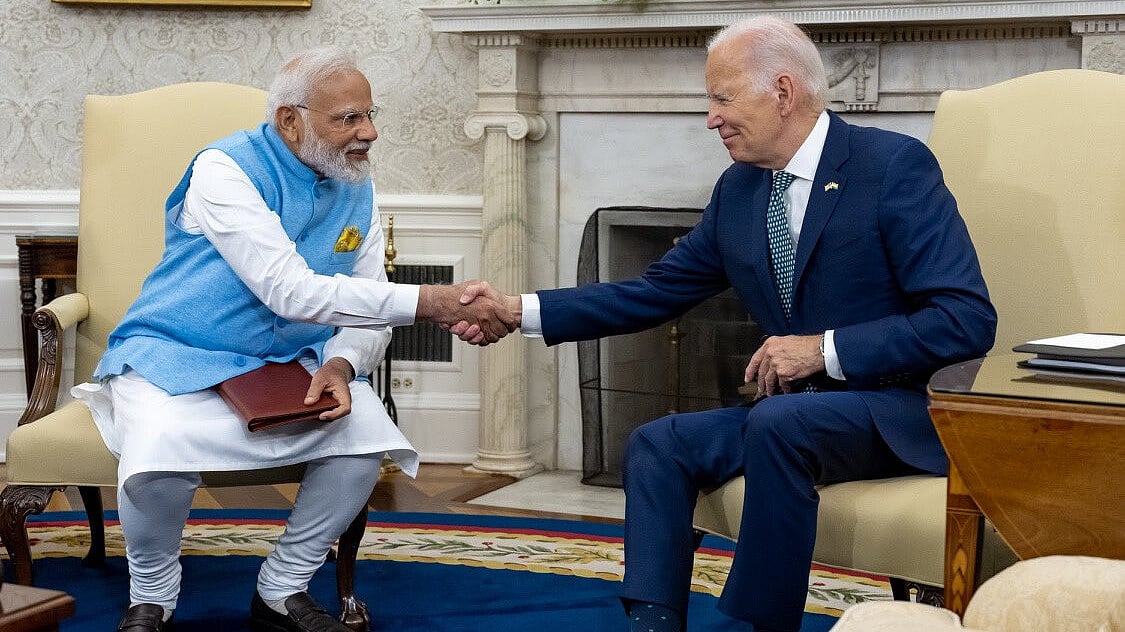Prior to Prime Minister Narendra Modi’s first ever state visit to the US on June 21-24, questions were raised amongst liberal voices in and outside the Democratic party about the state of Indian democracy. But President Joe Biden’s administration ignored the brouhaha, choosing pragmatism over defence of liberal democracy. The Indian government got a reprieve due to the US’s strategic need to contain or at least balance China. India’s economic potential also played a role as the US agreed to even share high technology, including co-producing cutting-edge military hardware.
The carefully calibrated visit proceeded smoothly until, on the insistence of the US to follow convention, a couple of questions were posed by one reporter from each side. Sabrina Siddiqui of the Wall Street Journal asked PM Modi whether treatment of minorities in India was in keeping with India’s democratic credentials. Prime Minister Modi, known to avoid media scrutiny, offered his standard response that democracy ran in India’s veins and was embedded in India’s DNA.
Immediately after the White House prime minister proceeded to Capitol Hill to address a joint session of the US Congress and Senate. A defence of India’s democracy and human rights record must have already figured in the prime minister’s address as 70 members of Congress and the Senate had written a bicameral letter urging President Biden to discuss the matter with Prime Minister Modi. Their letter noted that “A series of independent, credible reports reflect troubling signs in India towards shrinking of political space”. That would have ended the simmering debate had not former President Barack Obama sat down, almost simultaneously, for an interview with CNN’s Christiane Amnpour in Athens, considered the cradle of democracy. President Obama analysed the challenge of dealing with the democratic status of US’ friends and partners. He conceded that many nations were not run “in ways that I would say are ideally democratic”. And yet the US had to engage them. But in the case of India, as a friend, he went further to advise that unless ethnic minorities are protected India could start “pulling apart”.
BJP’s troll army reflexively launches a counter-attack whenever the slightest aspersion is cast on the BJP government’s handling of domestic affairs. One minister argued that a former president under whose charge the US had bombed multiple Muslim nations could hardly fault the Indian handling of its Muslim and other minorities. The analogy was wrong as under Obama US actions were not out of bigotry but part of post-9/11 counterterrorism. A BJP state chief minister went further to demonise Obama as a closet Muslim.
Then wrath was poured on Siddiqui. Her parentage was projected as Pakistani when her father is an Indian. Eventually the White House had to step in to condemn such trolling as it hurt freedom of press and expression. John Kirby, the spokesman of the US National Security Council, declared such attacks as completely unacceptable and antithetical to the principles of democracy.
As a result, the focus got shifted from a successful prime ministerial visit to the state of Indian democracy. Recently External Affairs Minister Dr S Jaishankar during his talk at the India International Centre sensibly avoided answering a question on President Obama’s remarks. This writer argued on the television and in a tweet that in fact Obama had adopted a similar stance during his second visit to India as chief guest at the 2015 Republic Day. His final engagement was a town-hall meeting at Siri Fort auditorium on January 27. In his carefully crafted speech, inter alia, he had said: “The peace we seek in the world begins in human hearts… India will succeed so long as it is not splintered along the lines of religious faith.” This was in essence what he repeated in his Amanpour interview now. But no protests occurred in 2015. Perhaps it is easier to troll a former rather than a serving president.
On the day of the television debate one of the headlines was the lynching of a Muslim youth suspected of carrying beef in his vehicle. Such news negates the entire defence of the Indian government on danger to rule of law and democracy. Actions and not words alone are required to counter the finger-pointing by India’s friends and foes abroad.
It is generally acknowledged that after BJP’s electoral defeat in Karnataka, the party seems readying for a highly polarising campaign before the upcoming state and then Lok Sabha elections. The renewed chant for a Uniform Civil Code is to facilitate this. The threat of an assertive and powerful China and the ongoing Ukraine War will ensure that US and Western powers will ignore BJP’s domestic politics and majoritarian agenda for now. But to earn global respect as a putative great power, the politics of polarisation must end — not simply to assuage friends abroad but to beget an India its founding fathers envisioned.
(KC Singh is former secretary, Ministry of External Affairs)







